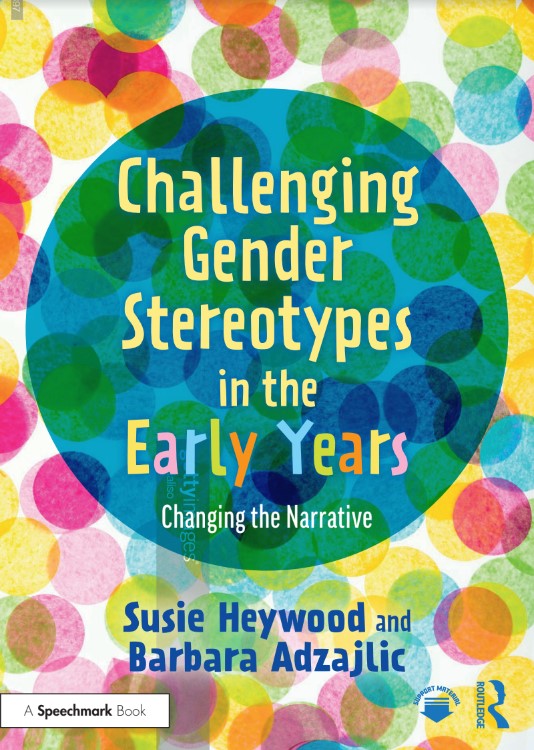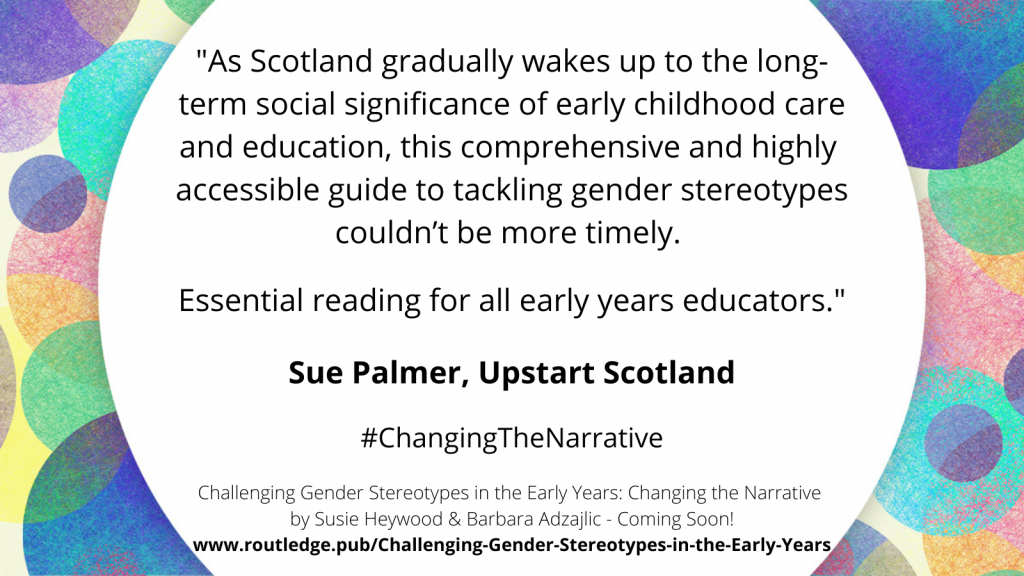
“Challenging Gender Stereotypes in the Early Years: Changing The Narrative” is now available from all good educational book sellers (and amazon).
We wrote this book to be a practical guide or handbook for anyone who wishes to understand why it’s important to tackle gender stereotypes in the early years and how we can do it. We answer the following questions:
What does gender equity mean for early years practitioners?
What are early years settings already doing to promote gender equality, and why is this so important?
How can we provide children with a solid basis from which they can grow into people who are not limited by society’s expectations of their gender?
Our book is a manual for every early years practitioner and anyone who comes into contact with children in the early years, who wishes to expand their knowledge and improve their practice around gender stereotyping in the early years. Drawing from our experiences developing a public health programme tackling gender stereotypes, it explores the reasons why gender inequality is still an issue, identifies the ways it is perpetuated and provides a framework and practical tools to drive change. The framework includes an audit process to celebrate areas of success and to identify areas for development, alongside a host of suggestions on how to navigate tricky situations in creative, respectful and effective ways.
With the voices and experiences of amazing experts and practitioners woven throughout, alongside key reflections and scenarios to critically engage with, Challenging Gender Stereotypes in the Early Years challenges readers to consider their own practice, drive staff awareness and make a difference to their setting.
Find out more and buy direct from our publisher here.
It was recently reviewed in Early Years Educator. Check it out!
If you are in a position to review our book, do get in touch and we can pass on details of how you may be able to access a review copy.
Here’s what some kind people had to say about it:
NPFS wholeheartedly recommend the work of Susie and Barbara. Whether you are an early years parent/carer, practitioner or allied professional – they provide an incredible insight into how gender stereotypes can limit children and how we can reduce them, making positive changes to the lives and experiences of our children and young people.
Margaret Wilson, Chair, The National Parent Forum of Scotland
respectme, Scotland’s Anti-Bullying Service sees gender stereotyping as a critical factor in many relationship, bullying and discrimination situations. This book delivers an invaluable resource for people who care for young children to understand why harmful attitudes towards gender stereotypes and inequalities, often emerging in the early years, can have lifelong impacts if left unchallenged.
Lorraine Glass, Policy and Improvement Manager, respectme
As Scotland gradually wakes up to the long-term social significance of early childhood care and education, this comprehensive and highly accessible guide to tackling gender stereotypes couldn’t be more timely. Essential reading for all early years educators.
Sue Palmer, Chair, Upstart Scotland
Preventing violence against women and girls should start in the early years. Susie and Barbara’s work helps practitioners understand the links between VAWG and the gender stereotypes that children are directed towards from an early age; and the significant part they can play in preventing it.
Davy Thompson, Campaign Director, White Ribbon Scotland
After being part of the documentary No More Boys and Girls I witnessed first hand the impact that gender stereotypes have on our children. Despite a rise in awareness there is still much work to be done and this book is paramount to helping educators make a difference to our children at an early stage – in my experience the earlier we can teach our children about spotting and dealing with stereotypes the better. This clear, practical guide is a must own for early years educators and written by experts in their field.
Graham Andre, Assistant Head at Lanesend Primary and teacher featured on No More Boys and Girls
Susie and Barbara are amazing and passionate trainers, who will open your eyes through their knowledge on gender equity. Their insights into this important subject will really challenge you to reflect on and update your practice.
Tracey Riseborough, Head of Kinderly Learn
A clear, logical and practical approach to addressing gender and other stereotypes in early years settings and why this is so important. A must-read for anyone studying or working in the early years and all early childhood settings.
Mary Beare Aust, Lecturer in Early Childhood Education, Institute of Technology Carlow

Other Great Books about Gender Stereotyping
The Gender Agenda by Ros Ball and James Millar (useful account of two parents experiences of how their kids are stereotyped or exposed to messages about gender as they grow up)
Man Up by Rebecca Asher is a particularly good book for learning more about how adults unconsciously interact differently with boys and girls, as well as loads of other useful stuff.
The Gendered Brain – Gina Rippon – discusses recent research busting the myth of male brains and female brains.
For great ideas on how to have health conversations about bodies, eating and exercise check out Body Happy Kids by Molly Forbes
Some of our favourite books for the early years (that we’ve actually read!)
Good practice around gender stereotyping does not necessarily mean throwing out every book which contains a gender stereotype or an absence of female characters. We like to think that even the most stereotypical books and stories can be used in ways to provoke conversation and challenge with the children – though there may be one or two that might be best off in the bin!
Even so, when looking to purchase new resources, it’s worth considering some of the great stories that are out there which challenge some of those all pervasive stereotypes. We have included some of our favourites below – and there are many more that we have not included simply because we haven’t read them yet, so there’s a list of places where you might find other suggestions at the end. With each book we have also tried to provide and explanation of why we like it and where relevant some thoughts and suggestions about the books can be used to initiate conversations with the children.
Happy reading!
Sophia Sparks – A Little Inventor with Incredible Ideas! By Elanor Best
A great story which follows our female inventor protagonist as she learns about problem solving, team work and the power of her own ideas. A great one for encouraging young girls in particular to believe in their capabilities around creativity and STEM.
Zog and the Flying Doctors. By Julie Donaldson & Axel Scheffler
Go on an adventure with Doctor (princess) Pearl as she helps a variety of sickly creatures and changes perceptions about what Princesses can do. Part way through the story Pearl is “captured” by her Uncle, the King, who tells her that “Princesses can’t be doctors!” – but she proves him wrong. There’s a chance here to explore with the children why he may think that way and how it makes Pearl feel to be told she can’t do the things she loves just because she is a princess.
The Lion Inside. By Rachel Bright & Jim Field
We love this story! While both the characters are male (that’s easily fixed!) the lesson here is that even the littlest people can be brave and the biggest fiercest people can be scared. A good one for the young moral rebels!
The Worst Princess. By Anna Kemp & Sara Ogilvie
The story of a princess waiting for her prince who finds out that the reality is not all it’s cracked up to be, so forges her own path with the help of a friendly dragon.
Giraffes Can’t Dance. By Giles Adrea & Guy Parker-Rees.
A classic tale about the animal (in this case a giraffe) who doesn’t quite fit in. We like any story which teaches children that it’s ok to be different, to stand out from the crowd and be proud of who you are. Given that the protagonist in the story is a giraffe there are opportunities here to have conversations about different bodies and abilities and how we can embrace the body we have.
The Detective Dog. By Julia Donaldson & Sara Ogilvie.
This one is a gem! The story of the wonderful detective dog Nell who loves the smell of books, who solves the mystery of the disappearing books. A great story for fostering a love of books, reading and libraries!
The Knight Who Said No. By Lucy Rowland and Kate Hindley.
An interesting story about a little boy dealing with frustration and anger, who befriends a dragon and find a bit of balance.
The Crocodile Who Didn’t Like Water. By Gemma Merino.
Another story about not fitting in and finding your tribe – there’s a theme here! This time it’s a crocodile. Another male protagonist, but this can be easily changed!
Why Do I Feel Scared? A first look at being brave. By Pat Thomas
At Gender Friendly Scotland we believe that teaching children to speak out and speak up is an important part of creating culture change, and this little book goes into some of these themes as it explores what it feels like to be brave. We like how it frames bravery as more than being an action hero. It contains some useful discussion questions for use with the children, and the pictures are bright, interesting and most importantly diverse.
The Start of Something Big. By Annahita De La Mare and Jennifer Kirkham.
Maybe one for the older children, but a lovely story of three adventurous young girls taking to the skies in a hot air balloon.